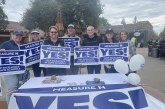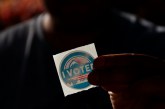 By Matt Williams
By Matt Williams
Twice in the past month I have been faced with a “laws vs. ethics” conundrum. The first came as part of a development application review process conducted by Yolo County’s South Davis General Plan Citizens Advisory Committee (the “committee”) regarding a proposal for eleven homes on the south side of Montgomery Boulevard (just south of Willowbank) under the provisions of the Yolo County Ag Cluster Housing Ordinance.
The second came yesterday as part of an ongoing discussion of how to assess the fairness of the Supply Charge in the CBFR rate structure.
In the first case a number of neighbors of the proposed development formally submitted e-mails to the committee raising concerns about the Ag Cluster Housing Ordinance’s past, present and future.
The challenge the committee faced in acknowledging the issues raised in those e-mails was that what the neighbors were asking the committee to do went far beyond the charge the committee was provided by the Board of Supervisors (BOS) when the committee was created.
Our BOS-provided scope says that the committee must look at project applications from the perspective of the regulations/ordinances that are in force. When and if those regulations/ordinances are changed by the BOS, the committee is expected to incorporate those changes into its current and future evaluations.
The committee decided that formal acknowledgement of and discussion about the submitted e-mails in a noticed meeting would allow the committee to deal in a very focused and public way with the committee’s BOS-provided charge.
The minutes of the noticed meeting would document the discussions of the BOS-provided charge topic, and that way when the same issue about what the committee does and doesn’t do inevitably surfaces in the future, the committee would be able to refer people to the 1/15/2013 meeting minutes that will permanently reside on the Yolo County website.
That was the plan, but that plan proved to be unacceptable to a number of the neighbors. They wanted the committee to disregard its charge and weigh in actively on the validity of the ordinance.
Despite the fact that the committee gave the neighbors clear guidance about where neighbors should send their concerns (to the Planning Commission and the Supervisors and Planning Department Staff) about the ordinance, frustration (even anger) was present, and one neighbor wrote all five Supervisors, all seven Yolo County Planning Commissioners, all five Davis City Council members and several staff members saying, “We are disappointed that the Yolo County, nor members of the South Davis Citizens Advisory Committee, have made any attempt at direct outreach regarding our concerns.”
The writer of those remarks clearly believes that the committee should have 1) thrown rules/laws aside and 2) discussed the ethical flaws of both the ordinance and the process that caused the ordinance to be passed into law.
————————-
In the second case one of the posters here on the Vanguard said, “Behind each correct law is an ethical principle. Ethics decides whether a law is correct. While it is lawful to abid by the law. It is ethical not to lose sight of true fairness. How do you decide if a law is correct? Is it possible for a law to be incorrect? If so, whose responsibility it is to identify them and remove them from legislature?”
As I read that post and also thought back to the words of the frustrated and angry Willowbank neighbor, two thoughts came to mind.
My first thought was that “Yes, laws an be incorrect, and yes we (as a society) should identify such incorrect laws and work to have them modified or eliminated. However, until those laws are formally changed they are the law of the land, and we have no choice other than to obey them.“
My second thought took a wider view toward one particular legal reality that exists here in the United States . . . Roe vs. Wade.
Some people believe that Roe vs Wade is totally and completely unethical.
Just as many people believe that Roe vs Wade is totally and completely ethical. How do you resolve that difference in those widely (wildly) different ethical perceptions? Is the disconnect that exists within our society about the ethics of Roe vs. Wade simply a “framing” conundrum”?
Or is it something much more fundamental?





Matt, I wish you would have introduced “CBFR” as you did with the others.
Consider today’s technology & science in light of R v. W.
Poster’s quote could have been fleshed out a little more, IMHO.
Fair enough AdRemmer. What follows is a quote that does some of that fleshing out. It comes from a post I made in the “Sunday Commentary II: Dunning’s Campaign” thread when a couple of people criticized the poster for forcefully expressing his frustration with my inability to see the situation we were discussing from his perspective. I had tried to explain to him that I did indeed see it from his perspective, but that the legal landscape prevented either he or me from acting on his perspective. To my way of thinking, he was acting in complete good faith throughout our discussion. He just was willing to “drive without a seatbelt and guardrails” and I wasn’t.
[i]”medwoman, I have no problem whatsoever with him expressing his frustration with our dialogue. He and I are caught in a “framing” conundrum. We are both looking at the same situation from very different perspectives. He wants a perfect theoretical solution that will bend the vagaries of real life to it. I start at the exact opposite end of the pendulum swing with the applied practical realities of the situation. The fact that we have been talking past one another is not a surprise. I respect him for his idealism. I respect him for his commitment to that idealism.
“His comment above displays that “framing” conundrum perfectly . . . absolutely perfectly. For him laws are trifling inconveniences on the path to true spiritual enlightenment. I’m 65 years old. 45 years ago I manned the barricades in the same kind of pursuit that he is following. Back in 1969 I was all about ethics trumping laws. I’m too old and too jaded and too arthritic and some would say too feeble-minded (davisite2?) to do that now. I have a hard enough time keeping up with the realities of life.
With that said, I have thoroughly enjoyed his idealism, and I look forward to hearing about its application in other venues beyond water. Keep the cards and letters coming. 8>)”[/i]
Re: Matt
I consider my posts public. You are free to name me as the poster. [Ref] ([url]http://davisvanguard.org/index.php?option=com_content&view=article&id=6126:sunday-commentary-ii-dunnings-campaign&catid=50:elections&Itemid=83&cpage=30#comment-176742[/url]) Thank you for your considerations.
I think the association between “ethics over law” and being unlawful is unnecessary. I first started realize that there is a gap in this understand was from the pepper-spray incident last year. I was not a protester. I was one of the people arguing against the protesters when they put up a petition calling for the chancellor to resign, because it did not follow the principle of de-escalation.
I found that we went through this before: 2012-04-26 – On Occupy US Bank Blockade ([url]http://davisvanguard.org/index.php?option=com_content&view=article&id=5298:students-and-faculty-rally-to-oppose-charge-on-bank-blockers&catid=74:court-watch&Itemid=100&cpage=60[/url])
(Note: I was arguing against the blockade.
I said:
[quote]There are two main possible objections against the blockade. The first is the fact that it was illegal. The second is the underlying stance against privatization. The following is about the second type of objection because I had previously addressed the lawful alternatives such as passing flyers that inform students which banks are socially responsible, where they should get financial help instead, and what they can do legally to stop tuition hike. [/quote]
[Ref] ([url]http://davisvanguard.org/index.php?option=com_content&view=article&id=5298:students-and-faculty-rally-to-oppose-charge-on-bank-blockers&catid=74:court-watch&Itemid=100&cpage=60[/url])
You are right Edgar, our “framing” of the world is very different, and therefore it is no surprise that we have a non intersecting set of principles. It is truly fascinating and remarkably consistent that given a wholly different situation you were headed one way while I was headed another way in very much the same manner that in this situation you have been headed one way and I have been headed another way.
It would appear that each of us is consistent.
I do not understand your comment.
Equal Discount is legal.
Edgar, I don’t even know what the connection is between Equal Discount and world “framing.” It appears that I lost you and you lost me. We have parity on that score.
Why don’t I come over to your side and try to do a better job of listening. One way to do that is to get a more granular understanding of how a fully fleshed out version of your Equal Discount idea would work for the Davis water agency. Can you lay that out for us? What proportion of Equal Discount’s revenues would come from fixed fees and what proportion would come from variable fees? What would those respective fees be? How much revenue would Equal Discount generate for the agency each year? How would the rate structure handle conservation?
I’m clearly not doing an effective job of explaining CBFR to you, hopefully you can have more success explaining Equal Discount to me.
Continue at here ([url]http://davisvanguard.org/index.php?option=com_content&view=article&id=6135:commentary-addressing-misconceptions-about-cbfr&catid=50:elections&Itemid=83&cpage=90#comment-176968[/url])
Edgar, as I said in the other thread, please flesh your high level concept out for us using the Davis system. All the data is available to you. I look forward to it in full flower. Expand your three person #1 out to be a 16,433 customer #1. fixed non-consumption-based distribution costs are $2.4 million (13.3% of total costs0. Fixed consumption-based costs are $ 12.0 million (66.7% of total costs). Variable costs are $3.6 million (20% of total costs). Total costs are $18 million.
By the way, and on a totally separate subject, how do you know the url for a specific comment? I know how to link an article, but how doy you get the comment number?
[ Equal Discount Calculator ] ([url]http://skylet.net/docs/2013-02-21-0231-EqualDiscountCalculator.htm[/url])
For the URL, I get them from the email subscription.
Ahhh. Thank you. That helps a lot. I had stopped checking that box. You have just given me a good reason to start checking it again.
Thanks.